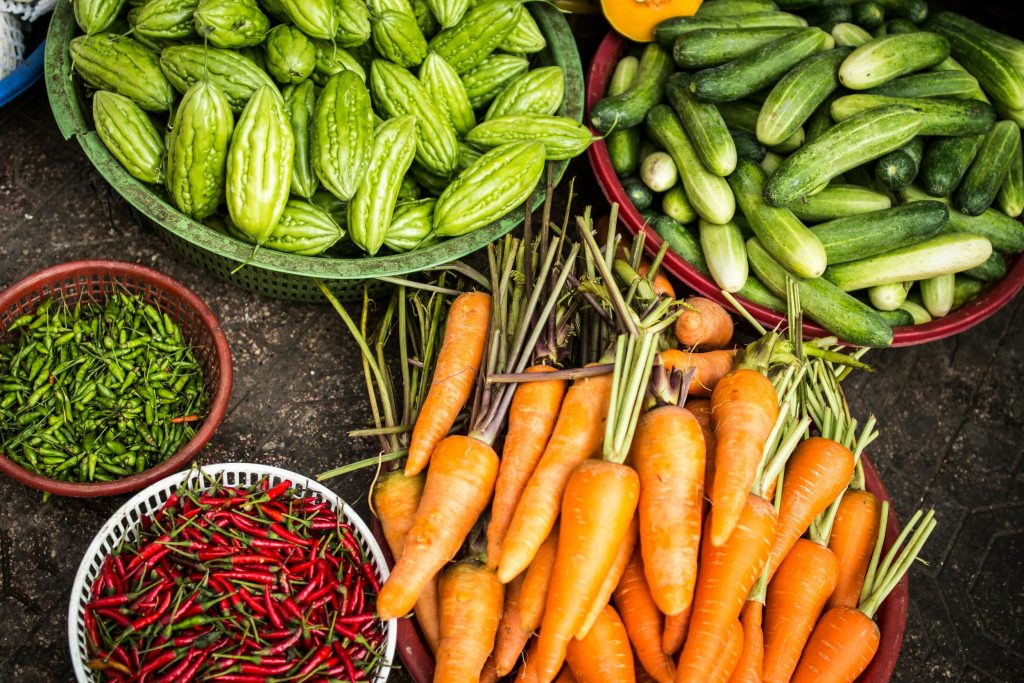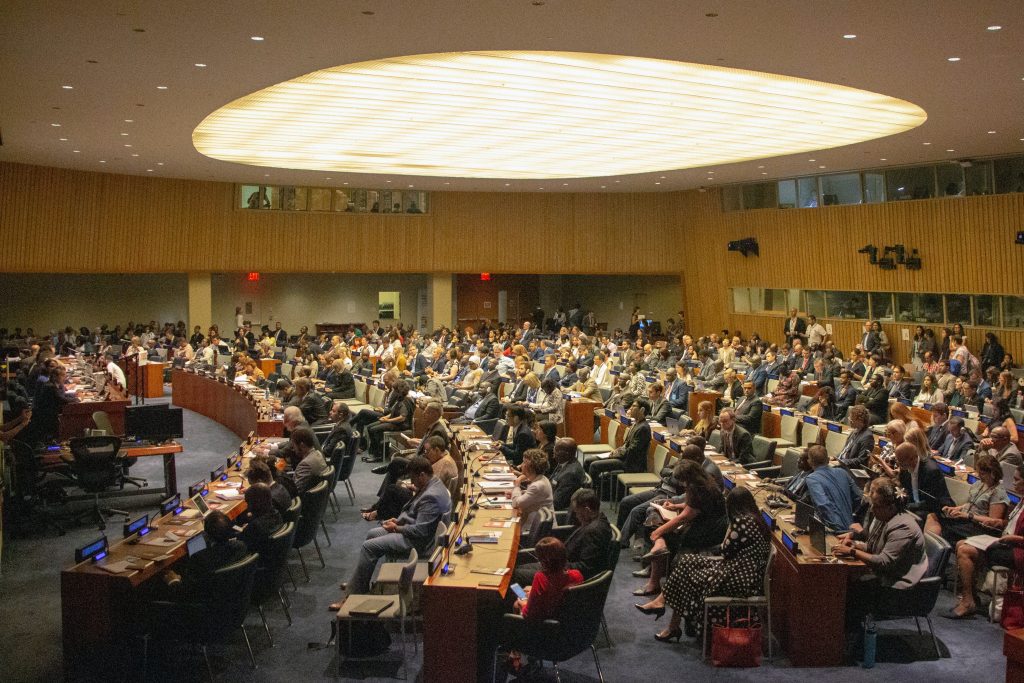We uncover why the choice of predominantly plant-based catering at COP28 is important
As the international community converges in Dubai for COP28, the decision to embrace two-thirds plant-based catering has been welcomed. This shift towards a predominantly plant-based menu holds immense significance as climate change threatens global stability.
What is COP?
Conference of the Parties (COP) is the decision-making body of the United Nations Framework Convention on Climate Change (UNFCCC). It gathers the 198 Parties that have signed on to the Framework Convention.
COPs are hosted annually in different countries, serving as the official meeting place for the Parties to negotiate and agree on how to limit global warming, confront climate change, and reduce emissions.
COP28, hosted by the UAE (November 30 – December 12, 2023), will be a momentous occasion for the world to unite in addressing global sustainability challenges and halting climate change.
Let’s look at why the choice of predominantly plant-based catering matters.
1. Puts food and agriculture firmly on the COP agenda
Until now, the food industry’s impact on the climate has been rarely mentioned at COPs, with greater emphasis given to energy and emissions, namely, reducing our reliance on fossil fuels.
However, agriculture accounts for about one-third of global greenhouse emissions, with nearly 20% of emissions coming from animal agriculture.1 Animal agriculture is also a major contributor to deforestation,2 water eutrophication,3 and biodiversity loss.4

The UN’s Intergovernmental Panel on Climate Change (IPCC) already recommends a shift to more plant-based diets to make the global food system more sustainable. This recommendation extends to diets in all scenarios – catering at events, food service menus, and food consumed in homes.
Choosing plant-based catering aligns with global efforts to combat climate change – and puts a magnifying lens on the carbon footprint associated with food production and consumption.
By making this decision, COP28 organizers firmly position the ‘food issue’ on the COP agenda. In this, they reflect a global recognition of the need for dietary shifts to address climate change.
As food professionals, understanding this choice (and promoting it through your businesses and events) can contribute to a broader commitment and shift towards more sustainable practices in the industry.
What else is happening?
As well as two-thirds plant-based catering, COP28 will see the first-ever Food, Agriculture and Water Day, and the publication of a ‘Roadmap to 1.5C’ by the UN Food and Agriculture Organization (FAO). Plus, for the second year in a row, COP has a Food4Climate Pavilion in the Blue Zone, co-hosted by ProVeg International.
2. Opportunity for policy alignment
The catering choices at COP28 can, for the first time, align with discussions happening during the conference and broader policy goals for a more sustainable world.

Since the conference focuses on climate change and implementing sustainable policies, serving plant-based meals reinforces a political commitment to these.
“We know that our food systems are intrinsically linked to the fate of our natural world, and so we have made the progressive decision to ensure that we explore how the catering provided across the event can be responsible and climate-conscious, helping to echo the emphasis we have placed on the Emirates Declaration.”
3. Highlights the importance of sustainable and environmentally friendly practices – in industry and daily life
Serving predominantly plant-based meals at events like COP28 can serve as a symbolic gesture to emphasize the importance of sustainable and environmentally friendly practices. It reinforces the idea that small changes in dietary choices can contribute to larger efforts to combat climate change and promote sustainability.
By taking steps to reduce the environmental impact of catering, COP28 organizers demonstrate leadership in implementing sustainable practices. This can inspire others to adopt similar practices in their events, businesses, and daily lives.
The move also acknowledges the interconnectedness of food choices and environmental sustainability, signaling a broader movement within the food industry towards aligning practices and product offerings with global climate goals.
4. Aligns with broader efforts to mitigate the impact of large-scale events on the environment
There has long been a call for a shift towards more sustainable food choices in large-scale events – at COPs, similar climate summits, other industry and political gatherings, and beyond.
At COP28, an estimated 250,000 meals will be served to more than 60,000 visitors every day (across nearly 80 outlets including food halls, grab-and-go stations, and food trucks).

The COP 1.5°C aligned menu is designed to enable delegates to eat within a ‘daily food budget’, calculated to curb global warming to less than 1.5 degrees Celsius – the limit agreed under the 2015 Paris Agreement.
By serving predominantly plant-based catering, COP28 has the potential to set a precedent for future global events. Plant-based options can become the new norm, creating a ripple effect throughout the food industry.
“We expect to see plant-based catering as well as emissions labeling on food embraced by other summits going forward. We certainly do not see this as a one-off, but rather another stage in a journey towards raising awareness of how to make our diets more climate-friendly.”
During an interview with Business Green, Martin Townsend, Director for BSI’s Center for Excellence for Sustainability (the company in charge of auditing COP28 sustainability efforts) said he hoped that COP28 would become the model for future global events. “The conference presents a critical opportunity to put the world on a more sustainable path,” he explained.6
“The implementation of the sustainable event standard, and the independent audit by BSI are clear commitments for the event itself – the lessons from which can offer both the opportunity to learn and improve and create a lasting legacy.”7
5. An opportunity to showcase the culinary diversity and creativity achievable with plant-based ingredients
As one of the world’s most critical summits, COP28 transcends borders and brings together people from across industries and territories.
With a showcase of plant-based catering and a focus on food sustainability, delegates attending the event are likely to have their eyes peeled for serendipitous business opportunities. Worth an estimated USD 40.21 billion in 2021, the plant-based market is expected to reach USD 78.95 billion by 2028 with a CAGR of 11.9%.8
COP28 catering provides an opportunity to showcase the culinary diversity and creativity achievable with plant-based ingredients, giving investors a chance to gain interest in the vibrant plant-based industry amidst the backdrop of sustainability.
For example, UK-founded caterer, PXB, will be serving classic reimagined dishes from around the world, like ‘Fsh’ and Chips, The Katsu, and Raw Carrot Cake. While UAE-based plant-based meat producer, Switch Foods, will offer comforting food truck meals like The Switch Kafta Wrap, The Switch Burger, and The Switch Grilled Arayes.

Creative plant-based catering also presents an opportunity for consumer education. COP28 organisers’ decision encourages attendees and global onlookers to reflect on their dietary habits and the broader implications of food production on the planet.
Additionally, it’s a chance to educate various stakeholders – caterers, restauranteurs, retailers, manufacturers, food scientists, marketers, etc – about the benefits of (and necessity for) sustainable food production and offerings.
As a food industry professional, being informed about these benefits allows you to contribute to the broader conversation around the role of food in environmental sustainability, influencing consumer preferences and behavior.
Conclusion: more than a menu adjustment
At COP28, the decision to implement two-thirds plant-based catering is more than a menu adjustment. It symbolizes a commitment to a sustainable future, embracing environmental responsibility, and acknowledges the pivotal role the food industry plays in addressing climate change.
For food industry professionals, understanding the significance of this shift positions you at the forefront of a movement towards a more sustainable, plant-centric culinary landscape.
Not only this, but ‘sustainable’ is good for business. The sustainability trend is present in every segment of consumer goods, altering consumer purchasing preferences and habits, especially those of flexitarians. Improving the environment is a factor that is driving many flexitarians to eat more plant-based foods. So, embrace sustainable plant-based foods in your business and reap the rewards!
Actionable insights
New Food Hub recommendations:
- Put plant-based food on your business’s agenda: Embrace and promote plant-based options in your business and events to contribute to broader sustainability goals. Add a plant-based range to your product line-up, or increase or improve current offerings.
- Implement sustainable business practices: Be inspired by COP28’s leadership in implementing sustainable practices in catering. Implement similar principles in your events and daily operations. Consider making sustainable choices a part of your business ethos to inspire others in the industry.
- Mitigate the impact of large-scale events: Recognize the call for a shift towards sustainable food choices in large-scale events. Explore ways to reduce the environmental impact of catering in your events and encourage the adoption of plant-based options as a new norm in the industry.
- Turn your food service business two-thirds plant-based: Do you run a catering company or restaurant? Follow in the footsteps of COP28 organizers by incorporating more plant-based dishes into your menu. Get menu strategy tips, here.
- Invest in the future of sustainable food: Recognize the potential for plant-based investments, ideas, and collaborations in the context of a sustainable food future. Explore partnerships with other industry leaders to capitalize on the growing interest in plant-based alternatives.
- Educate stakeholders and consumers: Use the media storm around COP28 to raise awareness about the environmental impact of the food industry. If you’re attending COP28, use meal breaks and networking opportunities to educate other stakeholders about the benefits and necessity of sustainable food production. Away from the event, incorporate educational elements into your marketing strategies to influence consumer preferences.
For more support on your plant-based strategy, contact our experts at [email protected].
References
- Xu, X., Sharma, P., Shu, S. Global greenhouse gas emissions from animal-based foods are twice those of plant-based foods, (2021). Nature. Available at: https://www.nature.com/articles/s43016-021-00358-x. Accessed 2023-11-30.
- Cerri, C.E.P., C.C. Cerri, S.M.F. Maia, M.R. Cherubin, B.J. Feigl & R. Lal (2018): Reducing Amazon Deforestation through Agricultural Intensification in the Cerrado for Advancing Food Security and Mitigating Climate Change. Sustainability. 10, p.989
- Mateo-Sagasta, Javier, Marjani Zadeh, Sara, Turral, Hugh. Water pollution from agriculture: a global review, (2017). Food and Agriculture Organization of the United Nations. Available at: https://www.fao.org/3/i7754e/i7754e.pdf. Accessed 2023-11-30.
- Benton, G., Tim, Bieg, Carling, Harwatt, Helen, Pudasaini, Roshan, Wellesley, Laura. Food system impacts on biodiversity loss, (2021). Chatham House. Available at: https://www.chathamhouse.org/sites/default/files/2021-02/2021-02-03-food-system-biodiversity-loss-benton-et-al_0.pdf. Accessed 2023-11-30.
- COP28: Two-thirds plant-based menu promised in first for UN Climate Summit, (2023). Business Green. Available at: https://www.businessgreen.com/news/4146819/cop28-thirds-plant-menu-promised-climate-summit. Accessed 2023-11-28.
- COP28: Two-thirds plant-based menu promised in first for UN Climate Summit, (2023). Business Green. Available at: https://www.businessgreen.com/news/4146819/cop28-thirds-plant-menu-promised-climate-summit. Accessed 2023-11-28.
- COP28: Two-thirds plant-based menu promised in first for UN Climate Summit, (2023). Business Green. Available at: https://www.businessgreen.com/news/4146819/cop28-thirds-plant-menu-promised-climate-summit. Accessed 2023-11-28.
- Vantage Market Research (2022): Plant Based Food Market Size, Share & Trends Analysis Report Global Industry Assessment (2016 – 2021) & Forecast (2022 – 2028). Available at: https://www.globenewswire.com/en/news-release/2022/04/20/2425380/0/en/Plant-Based-Food-Market-Size-to-Grow-by-USD-78-95-Billion-Revenue-Forecast-Company-Ranking-Competitive-Landscape-Growth-Factors-And-Trends-Vantage-Market-Research.html. Accessed 2023.



